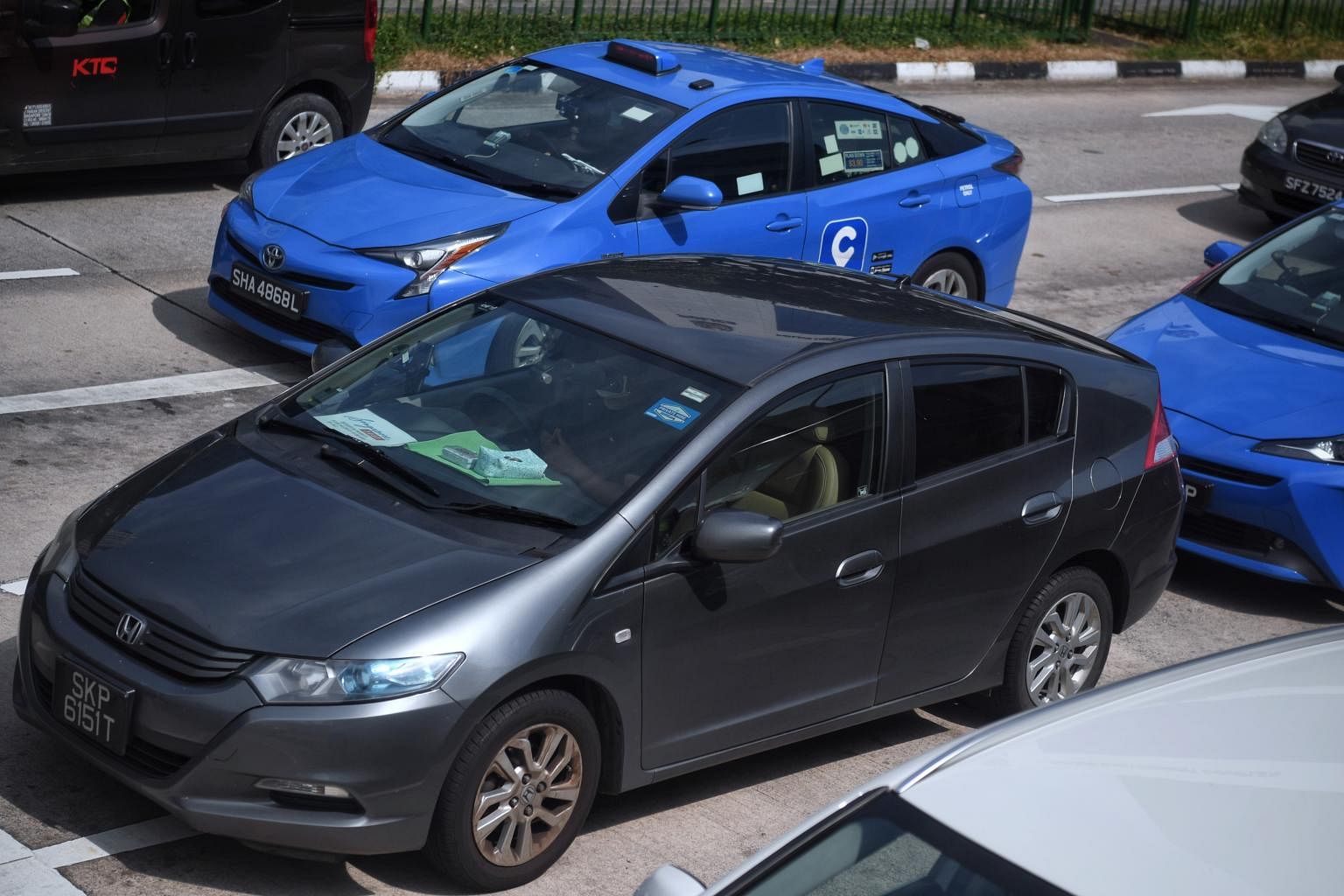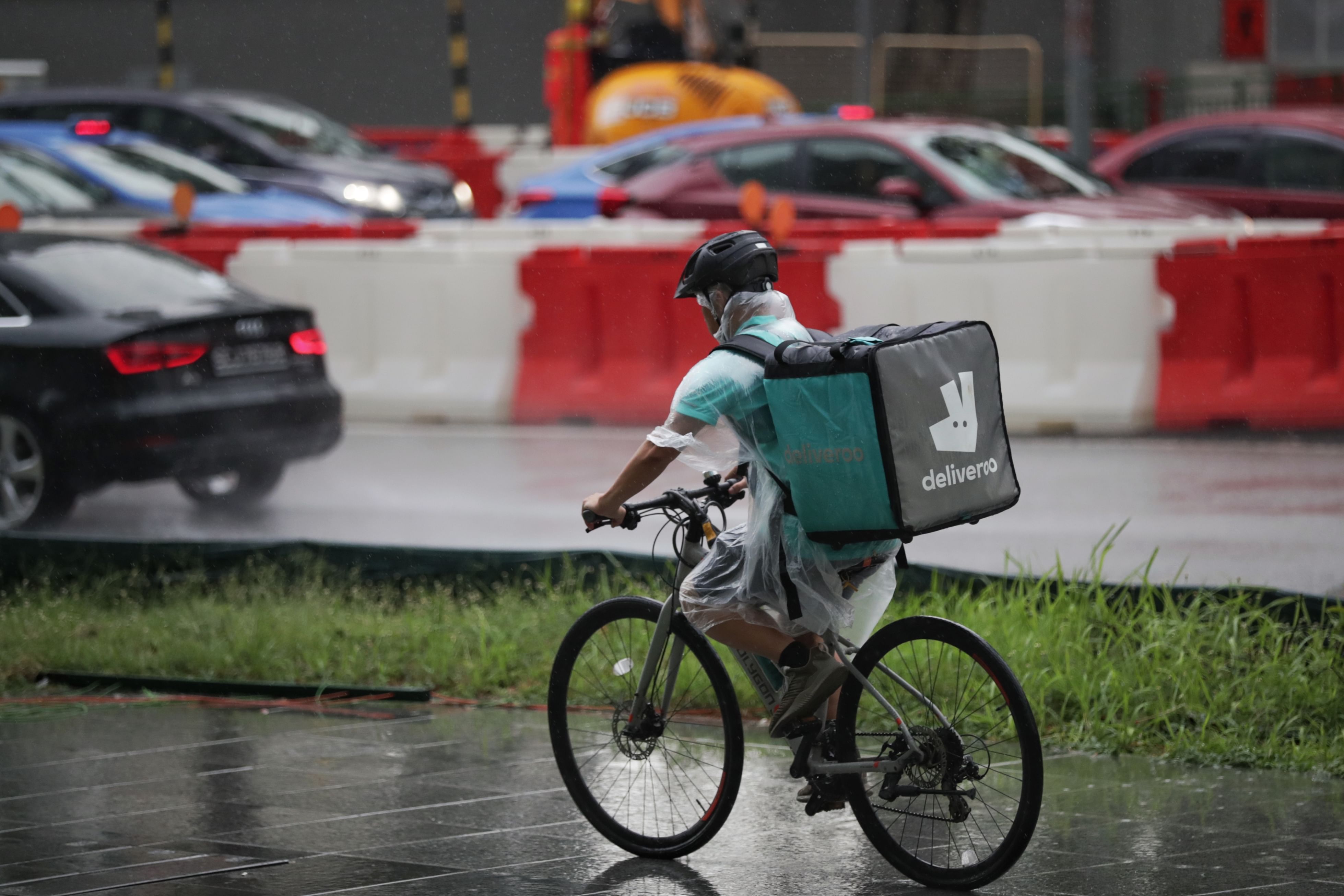Delivery, private-hire platform workers risk being trapped in poverty, precarity: Study
Sign up now: Get ST's newsletters delivered to your inbox

The flexibility on offer is a major draw for platform workers, with 76 per cent of the drivers citing it as a reason why they became PHV drivers.
PHOTO: ST FILE
SINGAPORE - Food delivery and private-hire vehicle (PHV) platforms allow people from low-income backgrounds to earn a quick buck and much more than what they normally would, but these workers run the risk of becoming trapped in poverty and precarity.
Researchers from the Institute of Policy Studies (IPS) warned of this in a study published on Monday (Feb 28).
They said in their working paper that these individuals may also become entrenched in such platform work, even as they see such jobs as a way out of unemployment and helplessness.
Because of a lack of savings and voluntary Central Provident Fund (CPF) contributions, being stuck in platform work also poses additional challenges to future aspirations, such as home ownership.
Hence, the IPS researchers proposed several interventions to address the downsides of platform work, including mandating or incentivising workers and companies to make contributions to CPF, health savings and insurance.
They also suggested more help be given to platform workers so they can pivot to new careers.
A basic level of protection should be made mandatory as this may allow for a more level playing field so that platform companies do not have to compromise on worker welfare in order to turn a profit.
The study used a mix of a survey and interviews with both PHV drivers and delivery riders, as well as observation.
Led by IPS principal research fellow and head of the institute's Social Lab, Dr Mathew Mathews, the study started in late 2019 and is still ongoing.
Through listings provided by ride-hailing firm Gojek, which provided funding for the study, 958 PHV drivers were surveyed.
Of these drivers, 75 per cent drove for other platforms, such as Grab, as well.
The researchers also conducted 75 in-depth interviews, and followed and observed a number of study participants at work.
Presenting the findings on Monday, Dr Mathews said the team hopes to poll delivery riders as well, but has yet to get a good sample.
The researchers found that involvement in full-time platform work can impede long-term career mobility and take time away from upskilling pursuits.
Older and better educated PHV drivers had a harder time finding other jobs similar to their previous roles or relevant to their education and training. About 49 per cent of PHV drivers polled felt they had no choice but to turn to platform work.
The flexibility on offer is a major draw for platform workers, with 76 per cent of the drivers citing it as a reason why they became PHV drivers.
But there exists a paradox for full-time platform workers as they may not be able to afford to enjoy this autonomy.

To earn a good wage, workers have to slog and "grind", said the researchers, citing the example of a delivery rider who earned more than $5,000 a month but had to cycle for more than 12 hours a day almost every day to hit that figure.
Before the pandemic, flexibility meant being able to earn a bigger income and spend more time with loved ones, said research associate Thian Wen Li. But with Covid-19 and changes to incentive structures, it now means volatility and insecurity.
Platform workers are also at the mercy of others, from opaque algorithms to changing policies, adding further stress to their physical and mental health.
So even though 57 per cent of those polled said they could tolerate the pressures of being a PHV driver, only about 40 per cent said they were satisfied with the job, and only 20 per cent said their overall quality of life had improved.
About 44 per cent said their health had worsened since they started driving.
Platform workers lack savings and are financially stressed, the researchers found.
Around 62 per cent of drivers surveyed said they did not have enough money set aside to take care of their personal and family needs for the next three to six months if they stopped working.
About 50 per cent did not make any voluntary CPF contributions.
There is also a possible trend of younger, lesser educated workers shunning conventional jobs as they view platform work as ideal.
The researchers said: "Our report does not provide insights into other types of similar work. Arguably the conditions for them may be as, or more, difficult.
"Nonetheless, the precarity that some of our respondents feel forebodes possible work conditions as more technology is developed to facilitate how people work.
"It is important at this juncture to consider the type of social protections that are necessary," they added.

In a panel discussion later on Monday, Associate Professor Irene Ng from the National University of Singapore’s department of social work said there may be a need to rethink employment legislation in order to cover the increasing number of platform-based and non-standard work arrangements.
But Professor Danny Quah, dean of the Lee Kuan Yew School of Public Policy, said changing labour laws may be a blunt instrument.
“For now, we are trying to see whether a fine-tuned adjustment that focuses on the specific characteristics of platform workers is something that might be better for everyone,” said Prof Quah, who is the vice-chairman of an advisory committee set up to strengthen protections for platform workers.
He added: “As we think about the dangers and risks of platform work, we need to constantly compare this with other parts of the employment landscape.”
Gojek Singapore’s general manager Lien Choong Luen said: “Even if you don’t believe in any altruism, the fact that (companies) have longer-term self-interest means that we need to take care of the (platform workers)... It is not adversarial.”
Five ways to provide support
In a study of workers who rely on jobs from online platforms such as ride-hailing and food delivery apps, researchers from the Institute of Policy Studies have proposed five interventions to support these platform workers.
• They suggested mandating, or at least incentivising, private-hire vehicle drivers, delivery riders and platform companies to contribute to the Central Provident Fund. This is to help workers save for their healthcare and retirement needs.
• The researchers proposed implementing a rest period policy for private-hire car drivers who spend long hours on the road. This would involve nudging drivers to rest after driving for a predetermined time, and encouraging them to lead healthier lifestyles.
• More assistance should be given to help platform workers pivot to new careers, said the researchers. They gave the example of raising awareness of schemes that help workers find work or reskill.
• The researchers suggested launching a public campaign to educate potential drivers and riders on the realities of platform work.
• Finally, Singapore's urban infrastructure could be designed to be friendlier and safer for food delivery riders, they added.
The researchers said it is crucial to recognise that platform workers are a diverse group. Any intervention must take this into account for it to be successful, they added.


